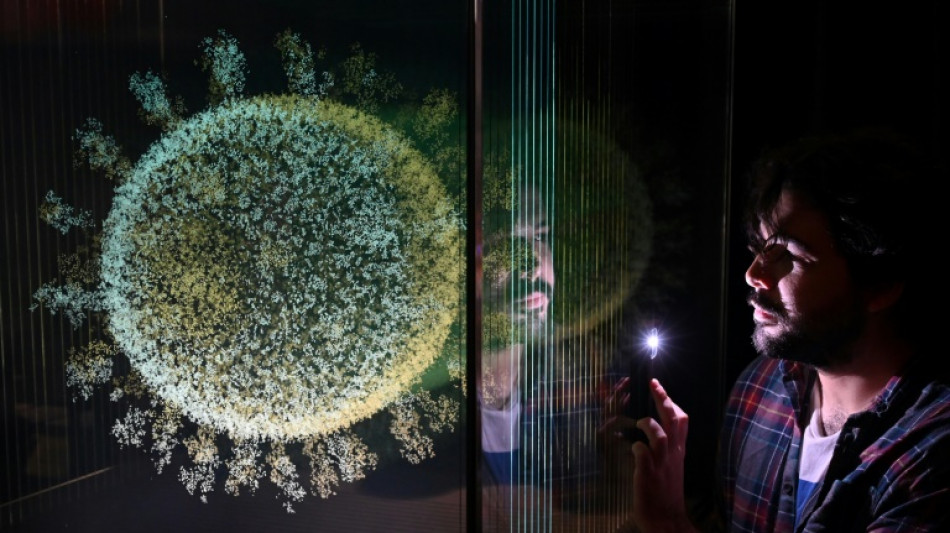
-
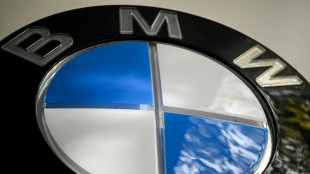 BMW reports rising profitability, shares jump
BMW reports rising profitability, shares jump
-
Bolivia Supreme Court orders release of jailed ex-president Jeanine Anez
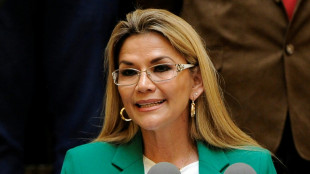
-
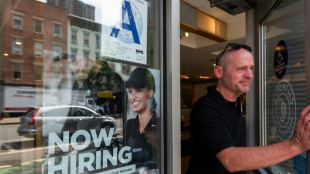 Wall Street stocks rise after positive jobs data
Wall Street stocks rise after positive jobs data
-
'Hostage diplomacy': longstanding Iran tactic presenting dilemma for West
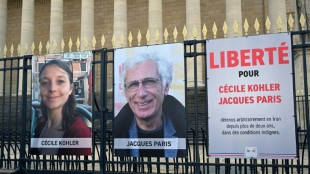
-
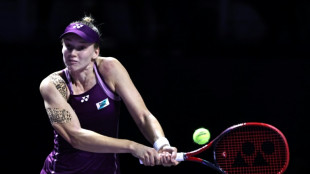 Rybakina stays perfect at WTA Finals with win over alternate Alexandrova
Rybakina stays perfect at WTA Finals with win over alternate Alexandrova
-
Le Garrec welcomes Dupont help in training for Springboks showdown
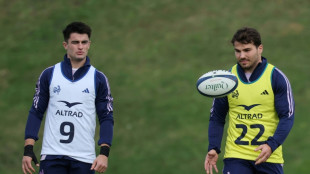
-
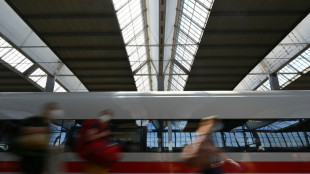 Brussels wants high-speed rail linking EU capitals by 2040
Brussels wants high-speed rail linking EU capitals by 2040
-
Swiss business chiefs met Trump on tariffs: Bern
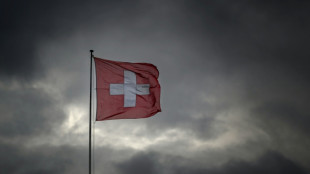
-
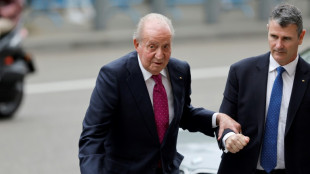 Spain's exiled king recounts history, scandals in wistful memoir
Spain's exiled king recounts history, scandals in wistful memoir
-
Wall Street stocks steady after positive jobs data
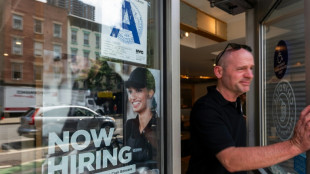
-
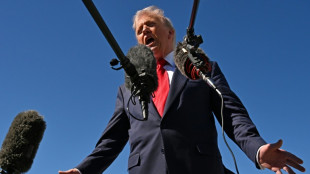 Trump blasts Democrats as government shutdown becomes longest ever
Trump blasts Democrats as government shutdown becomes longest ever
-
Indian pilgrims find 'warm welcome' in Pakistan despite tensions

-
 Inter and AC Milan complete purchase of San Siro
Inter and AC Milan complete purchase of San Siro
-
Swedish authorities inspect worksite conditions at steel startup Stegra

-
 Keys withdraws from WTA Finals with illness
Keys withdraws from WTA Finals with illness
-
Prince Harry says proud to be British despite new life in US

-
 EU strikes last-ditch deal on climate targets as COP30 looms
EU strikes last-ditch deal on climate targets as COP30 looms
-
Stocks retreat as tech bubble fears grow

-
 Shein opens first permanent store amid heavy police presence
Shein opens first permanent store amid heavy police presence
-
West Indies edge New Zealand despite Santner brilliance

-
 French pair released by Iran await return home
French pair released by Iran await return home
-
German factory orders up but outlook still muted

-
 Death toll tops 100 as Philippines digs out after typhoon
Death toll tops 100 as Philippines digs out after typhoon
-
Attack on key city in Sudan's Kordofan region kills 40: UN

-
 'No one could stop it': Sudanese describe mass rapes while fleeing El-Fasher
'No one could stop it': Sudanese describe mass rapes while fleeing El-Fasher
-
Champagne and cheers across New York as Mamdani soars to victory

-
 Medieval tower collapse adds to Italy's workplace toll
Medieval tower collapse adds to Italy's workplace toll
-
BMW boosts profitability despite China, tariff woes

-
 South Africa's Wiese wary of 'hurt' France before re-match
South Africa's Wiese wary of 'hurt' France before re-match
-
Beyond limits: Croatian freediver's breathtaking record

-
 Tottenham supporting Udogie after alleged gun threat in London
Tottenham supporting Udogie after alleged gun threat in London
-
Thunder roll Clippers to stay unbeaten as SGA keeps streak alive

-
 In appeal, Australian mushroom murderer alleges 'miscarriage of justice'
In appeal, Australian mushroom murderer alleges 'miscarriage of justice'
-
Toyota hikes profit forecasts 'despite US tariffs'

-
 Ex-France lock Willemse challenges Meafou to become 'the bully'
Ex-France lock Willemse challenges Meafou to become 'the bully'
-
Ukrainians to honour sporting dead by building country they 'died for': minister

-
 At least 7 dead after UPS cargo plane crashes near Louisville airport
At least 7 dead after UPS cargo plane crashes near Louisville airport
-
US Supreme Court hears challenge to Trump tariff powers

-
 US government shutdown becomes longest in history
US government shutdown becomes longest in history
-
India's Modi readies bellwether poll in poorest state

-
 Green goals versus growth needs: India's climate scorecard
Green goals versus growth needs: India's climate scorecard
-
Where things stand on China-US trade after Trump and Xi talk

-
 Sri Lanka targets big fish in anti-corruption push
Sri Lanka targets big fish in anti-corruption push
-
NY elects leftist mayor on big election night for Democrats

-
 Injured Jordie Barrett to miss rest of All Blacks tour
Injured Jordie Barrett to miss rest of All Blacks tour
-
Asian markets tumble as tech bubble fears grow

-
 Pay to protect: Brazil pitches new forest fund at COP30
Pay to protect: Brazil pitches new forest fund at COP30
-
Iraq's social media mercenaries dying for Russia

-
 Young leftist Trump foe elected New York mayor
Young leftist Trump foe elected New York mayor
-
Concerns at ILO over expected appointment of close Trump advisor


Crabs and tea cups: UK show lifts the lid on Covid vaccine race
From a scientist's laptop to the syringe used to inject the UK's first Covid vaccine dose, an exhibition that opened Wednesday in London recounts the quest to produce a coronavirus jab through objects.
The "Injecting Hope" show at the Science Museum "explores the worldwide effort to develop vaccines at pandemic speed", looking at key moments in their design, trial, manufacture and rollout, says deputy director Julia Knights.
Items on display include artworks, notes taken by UK vaccine chief Kate Bingham during early meetings to decide the country's strategy, and the syringe used to administer its first dose.
Machines used to manufacture the vaccine are also on show along with personal artefacts of those at the heart of the battle to beat the virus.
They include the laptop and mug that Teresa Lambe, co-developer of the Oxford University/AstraZeneca vaccine, relied upon during a weekend of intense work to calculate what its chemical composition should be.
"Once they had an understanding of the genetic make-up of this new virus, she essentially sat at home, on her laptop, in her pyjamas, drinking lots of cups of tea, designing a vaccine," explained exhibition curator Stewart Emmens.
"We have a laptop, we have a mug and we have a T-shirt on display here. It's nice, in amongst all the science, to really drive it home that there are people behind this, just normal people doing their jobs."
The museum began collecting objects related to Covid in February 2020 as "objects associated with epidemics and pandemics are largely missing from historic collections", said Emmens.
- 'Crucial' crabs -
The first section features news footage of lockdowns and images of deserted capital cities, empty shelves, at-home schoolchildren and food delivery apps, taking visitors back to the pre-vaccine world.
After exploring the development and testing of the products, visitors then get a glimpse into the unprecedented plans to administer the vaccine to Britain's 67 million citizens.
Along with Bingham's scribbled notes are maps integral to the UK's successful rollout.
"When we collected these, they were just plastered on the walls of NHS headquarters," explained Emmens.
"Most people would think... vaccinating countries would be a very much a digital project, very much a big data, number-crunching exercise.
"But here we have these physical maps, which were used quite early to work out where best to place vaccine centres."
He also hopes that the show will reassure those nervous about taking the vaccine due to its speedy arrival on the market.
"Nothing focuses the mind like a global pandemic," said Emmens.
"The vaccines were following the same processes of approval, and trialing and testing as would normally be the case," he said.
"But very cleverly, things were streamlined, overlapped in a way that gave the same results as you would get normally, without cutting corners."
Sitting incongruously among the gleaming machines are also a collection of crabs.
"We do have some examples of horseshoe crabs within the exhibition, which many visitors will be very surprised by," said Emmens.
The blood from the horseshoe crabs is highly sensitive to bacterial contamination, and is used to make sure the vaccine and the vials that carry it are clean, he explained.
"So they've played a... crucial if unlikely role in the vaccine story."
R.Adler--BTB




